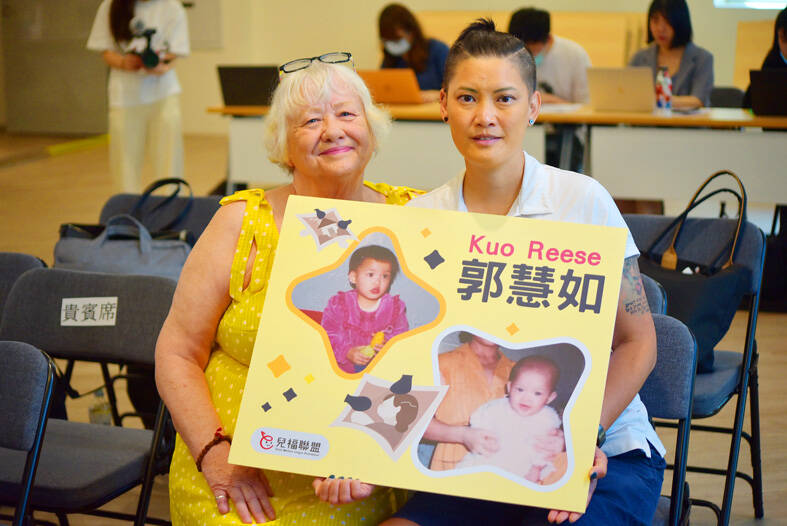Kuo Downing-Reese (郭慧如), a US flight paramedic who might have been the victim of a Taiwanese child-trafficking ring in the early 1980s, on Thursday appealed for the public’s help in finding her birth parents.
Accompanied by her adoptive mother Mary Reese, Downing-Reese has returned to Taiwan in an attempt to locate her birth family.
Private firms that provide genetic testing to help locate relatives are not common in Taiwan, Downing-Reese said, adding that her search on Web sites such as Ancestry.com and 23&me had proven unfruitful, reducing her hopes of finding her parents.

Photo: Wu Po-hsuan, Taipei Times
However, after a number of adoptees reported success in reuniting with their families in Taiwan, she became hopeful and decided to embark on her own campaign, Downing-Reese said.
She told a news conference organized by the Child Welfare League Foundation on Thursday that she wants to find her biological family because she wants the opportunity to get to know them.
If she has to go home empty-handed, she would try to use the trip as an opportunity to get to know Taiwan and its people better, Downing-Reese said.
In a mini-documentary on YouTube made by Taiwan-born New York filmmaker Hsi Cheng, Downing-Reese said she believes she is one of the “Julie Chu Babies.”
Although she has given Taiwanese media her birth information, the details might prove unhelpful if she is a victim of Julie Chu.
Chu, more commonly known in Taiwan as Chu Li-ching (褚麗卿), was a law clerk who was arrested on suspicion of leading a child-trafficking ring that was exposed in 1982.
Chu was allegedly the middleperson who helped families in Western countries such as the US, Australia, Finland and Sweden adopt children from Taiwan.
The families were all made aware of the opportunity to adopt through a British lawyer based in Thailand. After the families arrived in Taiwan, Chu took the parents through the process of adoption.
However, not all of the Taiwanese parents who gave up their children were who they claimed to be. It was found that the children were either given up by their birth parents or abducted at an early age.
To legalize the status of those toddlers, Chu was suspected of having hired people to pose as birth parents, as well as medical professionals to forge birth certificates and fake the children’s names, even going so far as to sometimes pass some children off as twins.
As a result, it is unknown whether Downing-Reese was trafficked or legally put up for adoption.
Chu was convicted and served time for forgery. She maintains she was not involved in a ring and is innocent of kidnapping, saying she was only guilty of falsifying papers to help orphans live a better life.
The foundation presented the information of two other Taiwan-born women whose adoptions were mediated by Chu.
Both women, Sabina Soderlund-Myllyharju (范嫚倫) and Kimbra Smith (陳信惠), have unsuccessfully attempted to find their biological families in Taiwan.

The first global hotel Keys Selection by the Michelin Guide includes four hotels in Taiwan, Michelin announced yesterday. All four received the “Michelin One Key,” indicating guests are to experience a “very special stay” at any of the locations as the establishments are “a true gem with personality. Service always goes the extra mile, and the hotel provides much more than others in its price range.” Of the four hotels, three are located in Taipei and one in Taichung. In Taipei, the One Key accolades were awarded to the Capella Taipei, Kimpton Da An Taipei and Mandarin Oriental Taipei. Capella Taipei was described by

EVA Airways today confirmed the death of a flight attendant on Saturday upon their return to Taiwan and said an internal investigation has been launched, as criticism mounted over a social media post accusing the airline of failing to offer sufficient employee protections. According to the post, the flight attendant complained of feeling sick on board a flight, but was unable to take sick leave or access medical care. The crew member allegedly did not receive assistance from the chief purser, who failed to heed their requests for medical attention or call an ambulance once the flight landed, the post said. As sick

The Taichung District Court yesterday confirmed its final ruling that the marriage between teenage heir Lai (賴) and a man surnamed Hsia (夏) was legally invalid, preventing Hsia from inheriting Lai’s NT$500 million (US$16.37 million) estate. The court confirmed that Hsia chose not to appeal the civil judgement after the court handed down its ruling in June, making the decision final. In the June ruling, the court said that Lai, 18, and Hsia, 26, showed “no mutual admiration before the marriage” and that their interactions were “distant and unfamiliar.” The judge concluded that the couple lacked the “true intention of

INDUSTRY: Beijing’s latest export measures go beyond targeting the US and would likely affect any country that uses Chinese rare earths or related tech, an academic said Taiwanese industries could face significant disruption from China’s newly tightened export controls on rare earth elements, as much of Taiwan’s supply indirectly depends on Chinese materials processed in Japan, a local expert said yesterday. Kristy Hsu (徐遵慈), director of the Taiwan ASEAN Studies Center at the Chung-Hua Institution for Economic Research, said that China’s latest export measures go far beyond targeting the US and would likely affect any country that uses Chinese rare earths or related technologies. With Japan and Southeast Asian countries among those expected to be hit, Taiwan could feel the impact through its reliance on Japanese-made semi-finished products and